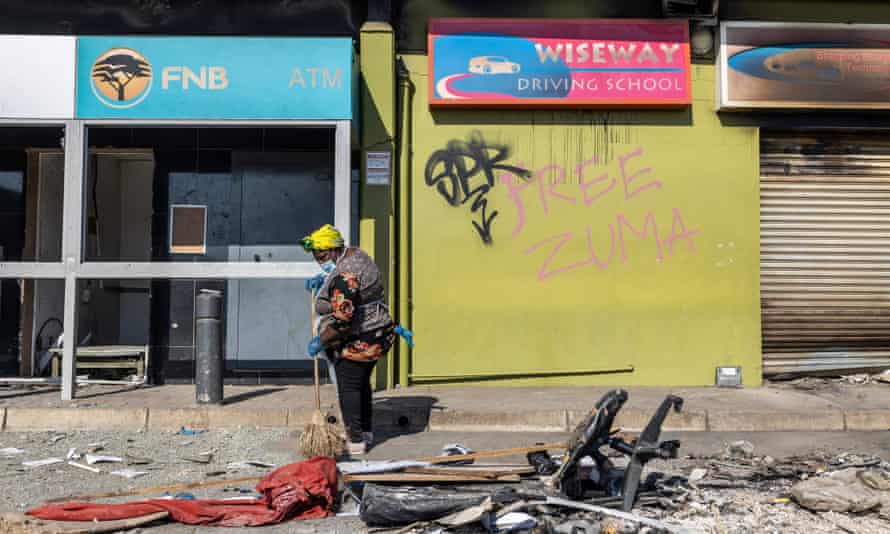The Observer view on South Africa’s problems

Today is the anniversary of the birthday of Nelson Mandela, the first president of a free South Africa and a global symbol of tolerance, sacrifice, integrity and the battle against racism.
When, in 2009, the UN declared 18 July a day to honour Mandela’s values, South Africa was still seen worldwide as a success story. The “rainbow nation” had overcome the violent racial oppression of its past and was fighting apartheid’s toxic legacy of economic inequality. It had one of the most progressive constitutions in the world and a steady record of economic growth. The challenges the new democracy faced were all too evident, but South Africa’s recent history seemed a message of hope for us all nonetheless.
This weekend, it is despair that dominates. Days of violent protest, looting and vandalism have left the country staggering. The economy was already faltering even before Covid struck and has now sustained a further catastrophic blow. President Cyril Ramaphosa, who took power in 2018, has called for steadfast defence of South Africa’s democracy against what he says is a deliberate attempt to prompt an insurrection. The rule of law looks shaky. Racial tensions are high. The chances of a tolerant, prosperous future now look dim.
So what went wrong? In 2007, the African National Congress, the ruling party, selected Jacob Zuma as its leader. Two years later, Zuma became president too. The contrast with Mandela, canonised as a secular saint, was stark. No one would describe Zuma as a model of probity. He did, however, have impeccable credentials as a frontline fighter in the battle against apartheid and was popular with the party’s grassroots.
Over the next nine years, Zuma presided over an assault on South Africa’s institutions, public utilities and government. Graft contaminated almost every corner of public life, unemployment and crime soared after years of decline. The health service and the police suffered very badly. Zuma and his supporters said they were helping the poor. In fact, many were helping themselves.
Eventually, Zuma was ousted and Ramaphosa took over. The former labour activist turned tycoon set about cleansing South Africa’s Augean stables. This is a herculean task but one Ramaphosa has approached with grim determination, even if his execution has been slow. A problem has been trying to manage the factional battles within the ANC. Ramaphosa leads a moderate coalition within the ruling party and has wide support. But his efforts to avoid the confrontation with those still loyal to Zuma have failed. Zuma’s imprisonment on contempt of court charges sparked the unrest and it appears to have been instigated by his followers.
Perhaps if Ramaphosa had been less concerned with the internal politics of the ruling party and had hit harder or earlier to enforce the rule of law, the events of recent days could have been avoided. All too often, ANC politicians have put the interests of the party above those of the country. Ramaphosa, too, may be guilty of this. If his country is to prosper, this must stop.
But though many will despair for South Africa, this newspaper is not among them. The Observer supported the anti-apartheid struggle through its darkest days, celebrated the downfall of that evil regime and still believes in the capacity of South Africans to create a better country for all citizens. Recent days have seen appalling violence but also communities coming together to clear the shattered glass, protect vital services and help those left without bread.
Those who hoped to derail Ramaphosa’s efforts at reform are unlikely to succeed and their failure will strengthen South Africa’s democracy. This should give hope to all those who care about this troubled, inspiring country.
No comments:
Post a Comment